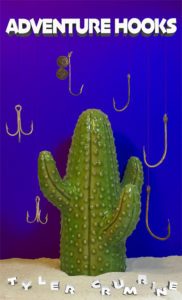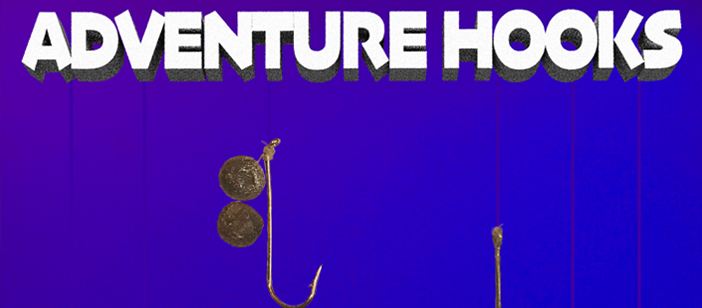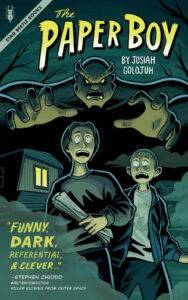Tyler Crumrine is a Pittsburgh-based designer & dramaturg and the author of Adventure Hooks (Cool Skull Press, 2018). Tyler is also the founding editor of Plays Inverse Press. Past design and dramaturgy credits include: The Kennedy Center, Signature Theatre Company, Bricolage Production Company, City Theatre Company, Pittsburgh Irish & Classical Theatre, Hotel Amerika, Switchback Books, and The Lettered Streets Press.
Don’t miss out: The launch party for Adventure Hooks will be at White Whale on July 13th… and if this Q&A is any indication, it’s going to be super-fun!
From the Publisher: “You’re walking along the winding path of life. You’re enjoying the adventure. You’re engaging in swashbuckling conflicts, visiting exciting locales, chasing exploits for wealth and whimsy, passing from sunlit glen to goblin cave to enchanted dale, when suddenly… it stops. The adventure, I mean. It becomes tedious, bland, a nihilistic exercise in futility. Another level, another gemstone, another undead king to fell. How do you bring the magic back?
Enter Adventure Hooks by Tyler Crumrine. Roll your dice, consult the book, and suddenly:
- Your weapons are sentient! Worse yet, they’re in charge!
- You’re being haunted by your childhood pets!
- Your haters make you more powerful! Go cause a scene!
- Everyone in the world gets three wishes! Look out!
- Where did those clouds come from? Oh no! Acid rain!
- Frictionless reality!
- Mysterious glitches!
- Governmental overreach!
Adventure Hooks will put the pizzazz in your picaresque, the vigor in your voyage, the questionable in your quests. These tabletop-RPG-ready hybrid poems operate like little imaginative boosts for you and your adventuring team. Use them unwisely; the results will hook you.”“All lives—even those created in character sheets—beg for an occasional break from the restraints of the ordinary. Hilarious, helpful, & surprisingly insightful, Adventure Hooks gives a welcome influx of good-natured delirium to the dice-rolling worlds and doubles as a tour de force exploration of a previously unknown literary genre. As much a product of Dada & surrealism as of RPGs, Tyler Crumrine’s fertile & riotous imagination will hook you in all your campaigns, whether they be imaginary or real.” — Mathias Svalina, author of Destruction Myth and Wastoid
Adventure Hooks is also available as a pay-what-you-will PDF (but if you like what you read, you’re definitely going to want a hard copy!).
 What exactly is Adventure Hooks? Is it a book you can read on its own, or is it supposed to be used with games like Dungeons & Dragons?
What exactly is Adventure Hooks? Is it a book you can read on its own, or is it supposed to be used with games like Dungeons & Dragons?
It’s both! In roleplaying game terms, “adventure hooks” are plot points a gamemaster (the game’s narrator-slash-referee) could easily drop into a play session to further encourage storytelling from its players. Usually it’s something interesting enough that it “hooks” the players’ curiosity while remaining vague enough that there’s still room for the players to tell their own stories. Adventure hooks are essentially the RPG equivalents of writing prompts or improv suggestions.
One of the shorter entries in my collection, for example, is simply: “In this adventure, no one believes in god and you’re performing miracles.” It doesn’t specify a who, what, where, or why, but if you included that hook as a detail in a game all sorts of other questions would come up. Such as: Why can your character perform miracles but not others? What kind of miracles are you performing? How do nonbelievers respond to your powers? Do you hide your talent or flaunt it? None of those things are for me to decide, though, that’s left up to the GM & players. But whatever they decide, it’s bound to be more interesting than “I’m here to slay the dragon.”
You can also just read the book as a collection of speculative fiction, though (thanks in no small part to my editor August Smith). We worked together to make sure each entry operates as its own micro-fiction or prose poem, stripping out any language that’s TOO inside baseball or that strictly applies to game mechanics. The hooks are written entirely in second person, so each one gives you a little fantasy and then asks “what would you in this situation?” Sometimes they’re playful thought experiments, other times they’re intense moral quandaries. Either way, each entry is a little world you can visit for a time and stay as long as you like.
Why did you decide to write this as a game book… why not a collection of short stories?
I work in theatre, so a lot my favorite literature is essentially instruction manuals, haha. Which isn’t a knock against dramatic literature! I actually really love that you can enjoy a play’s script on its own, but that there’s also this whole other half of the equation that you can only experience when it’s performed.
RPG books work in a similar way. Fantasy world building is fun wherever you find it, but an RPG’s setting explicitly invites the reader to take what the author gives them and run with it on their own. When writing for RPGs you’re writing with an audience of collaborators in mind, and I’d much rather interact with readers in that way than try to write the next Silmarillion.
Are there any non-gaming books that had a strong impact on you while writing this?
Definitely! My biggest inspiration by far was the hybrid-novel Invisible Cities by Italo Calvino. In it, Calvino describes 55 fantastical, imagined cities—each of which can be read as parables or meditations on culture, language, time, memory, death, or the general nature of human experience. And while each city described is unique, each story also describes something about the narrator’s home city, Venice.
I wanted to do the same with my 60 adventure hooks. Each entry is an adventure in and of itself, but as a whole they’re reflections on the day-to-day adventures of life. Life’s one big series of adventures, but it’s a game too, so I’ve tried to maintain a certain amount of playfulness throughout.
You have a release reading coming up at White Whale on July 13—Since this is a game book, what do readings from it look like?
Like any other reading for the most part! I ask an audience member to roll two twenty-side dice on the table of contents and then I read a collection of adventures from that page onward. The book is a serial exploration of the idea of an adventure, so there winds being this rhythmic effect reading one after another… kind of like reading a catalogue poem.
Afterwards, I’ll always try and improvise a few adventures for the audience! Each hook starts with the words “IN THIS ADVENTURE…” so it’s usually just a matter of finishing the sentence based on a suggestion and then building from there. It’s super, super fun, and it helps capture some of the book’s collaborative side.
For folks interested in checking out RPGs, are there any games you’d recommend for first-time players?
Yes! One of the easiest RPGs to pick up and play that I’ve found is John Harper’s Lasers & Feelings… plus it’s free! It’s only one page long, and all you need is a couple of friends and some standard, six-sided dice to play. There’s no intense rule set or complicated math involved, just some guidelines to help you improvise a story with your friends. It’s one of the simplest, most elegantly designed games out there, and you can read or print out a copy of your own at: http://www.onesevendesign.com/laserfeelings/
For more about Adventure Hooks by Tyler Crumrine, visit Cool Skull Press!

























